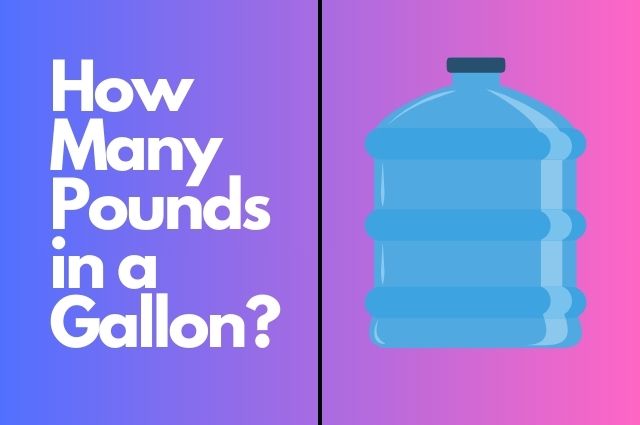
When dealing with liquids, understanding the relationship between volume and weight measurements is crucial. While gallons measure volume, pounds measure weight or mass. Converting between these units requires knowledge of the liquid’s density. In this comprehensive article, we’ll explore how many pounds are in a gallon for various common liquids.
How Many Pounds in A Gallon of Water?
Water, being a fundamental liquid, serves as a good starting point. At room temperature (62°F or 17°C), water has a density of approximately 8.34 pounds per gallon (3.78 kg/gallon). This means that one US gallon (3.79 liters) of water weighs around 8.34 pounds.
It’s important to note that the weight of a gallon of water can vary slightly depending on the temperature. As water heats up, it expands, decreasing its density and weight per gallon. Conversely, colder water is denser and therefore heavier per gallon. For example, at 32°F (0°C), a gallon of water weighs around 8.35 pounds, while at 212°F (100°C), it weighs approximately 8.02 pounds.
How Many Pounds in A Gallon of Milk?
Milk, a staple in many households, has a slightly higher density than water due to its composition. On average, a gallon of whole milk weighs around 8.6 pounds (3.9 kg).
However, the exact weight can vary depending on the fat content of the milk. Skim milk, which has a lower fat content, is slightly heavier than whole milk, weighing around 8.7 pounds per gallon. On the other hand, cream, which has a higher fat content, is lighter than whole milk, with a gallon weighing around 8.5 pounds.
How Many Pounds in A Gallon of Honey?
Honey, a thick and viscous liquid, is much denser than water or milk. On average, a gallon of honey weighs around 12 pounds (5.4 kg).
It’s worth noting that the weight of honey can vary slightly depending on its water content and the type of honey (e.g., clover honey vs. wildflower honey). However, the difference is relatively small, and most types of honey fall within the range of 11.5 to 12.5 pounds per gallon.
How Many Pounds in A Gallon of Gas?
Gasoline, or petrol, is a lighter liquid than water, with a density of around 6.2 pounds per gallon (2.8 kg/gallon). This means that a gallon of gasoline weighs approximately 6.2 pounds.
It’s important to note that the weight of gasoline can vary slightly depending on its composition and the temperature at which it’s measured. However, the variation is typically small, and most gasoline falls within the range of 6.0 to 6.4 pounds per gallon.
How Many Pounds in A Gallon of Oil?
The weight of a gallon of oil can vary significantly depending on the type of oil. For example, a gallon of vegetable oil typically weighs around 7.7 pounds (3.5 kg), while a gallon of motor oil weighs around 7.3 pounds (3.3 kg).
Heavier oils, such as crude oil, can weigh even more per gallon. For instance, a gallon of heavy crude oil can weigh up to 8.5 pounds (3.9 kg), while a gallon of light crude oil may weigh as little as 6.5 pounds (2.9 kg).
How Many Pounds in A Gallon of Diesel?
Diesel fuel is slightly heavier than gasoline, with a density of around 7.1 pounds per gallon (3.2 kg/gallon). This means that a gallon of diesel fuel weighs approximately 7.1 pounds.
As with other liquids, the weight of diesel fuel can vary slightly depending on its composition and temperature. However, the variation is typically small, and most diesel fuel falls within the range of 6.9 to 7.3 pounds per gallon.
Factors Affecting Liquid Density and Weight
While the above figures provide a general guideline, it’s important to understand that the density and weight of liquids can be influenced by various factors, including:
- Temperature: As mentioned earlier, temperature can significantly affect the density and weight of liquids. Generally, liquids become less dense as they heat up and more dense as they cool down.
- Pressure: Liquids are slightly compressible, meaning that their density and weight can increase under higher pressures.
- Composition: The chemical composition of a liquid can affect its density. For example, the density of gasoline can vary depending on the blend of hydrocarbons and additives.
- Impurities: The presence of impurities or dissolved substances can alter the density of a liquid.
- Altitude: Changes in altitude can affect the pressure and temperature, which in turn can influence the density and weight of liquids.
In conclusion, understanding the weight of a gallon for different liquids is crucial in various applications, such as transportation, storage, and chemical processes. While a gallon of water weighs around 8.34 pounds, a gallon of honey can weigh up to 12 pounds, and a gallon of gasoline weighs only around 6.2 pounds. By considering the factors that affect liquid density, you can make more accurate weight calculations and ensure proper handling and measurement of liquids in your specific application.
Also read: How Big is an 8X10 Picture?







